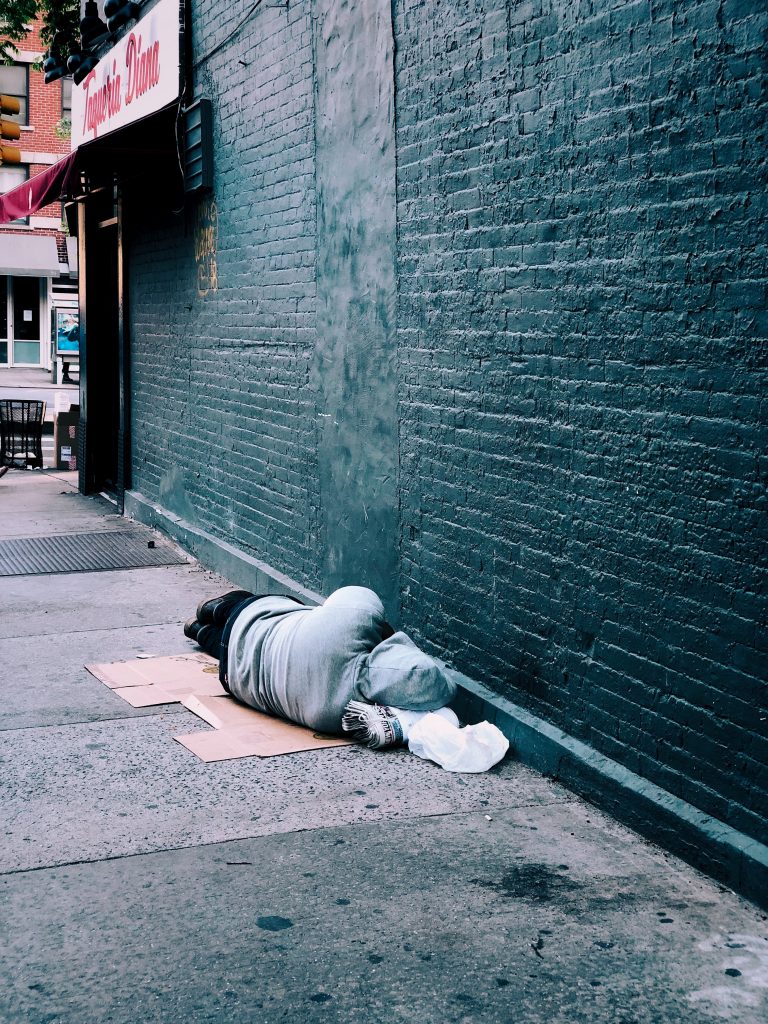Canada News
Homelessness is a life or death issue during a pandemic

It is impossible to physically distance while sleeping on a mat in a homeless shelter. (File Photo by Jon Tyson/Unsplash)
COVID-19 has powerfully illuminated that having a home is a matter of life or death as governments around the world have invoked stay-home policies as central to flattening the pandemic curve and reducing infection rates. In Canada and many other countries, housing has become the frontline of defense against the virus.
As Canada struggles with homelessness, high rates of core housing need, and a severe lack of affordable housing, compliance with these stay-home policies is impossible for hundreds of thousands of people. While public health orders like stay at home, wash your hands, and physically distance are seemingly neutral, they have a disproportionate impact on people who are unsheltered or precariously housed.
It is impossible to physically distance while sleeping on a mat in a homeless shelter. It is difficult to properly wash your hands if you live under a water-boil advisory on a First Nations reserve. How can you stay home if you haven’t got one? For these populations, absent state intervention and support, the mantra of “stay home” serves as mockery more than a life-saving measure.
COVID-19 has laid bare the failure of Canadian governments to effectively implement the right to housing. This right is codified in the International Covenant on Economic, Social, and Cultural Rights, defined as “the right of everyone to an adequate standard of living for himself and his family, including adequate food, clothing and housing, and to the continuous improvement of living conditions.”
To understand housing as a right is to understand it as a social good. This means recognizing housing as more than mere physical shelter, but as foundational to safety, security and dignity. In the wake of COVID-19, those without access to adequate housing face profound and complex barriers to staying safe or protecting themselves.
The stakes involved in failing to implement the right to housing are particularly visible from the experiences of two populations: people experiencing homelessness and low-income renters. Their experiences demonstrate the urgent need for a rights-based approach to housing in Canada.
People experiencing homelessness
For those trapped in situations of homelessness, COVID-19 presents a severe threat to life. Those on the streets face significant health challenges, including high rates of respiratory illnesses, putting them at greater risk of contracting COVID-19 and experiencing worse health outcomes, including death. This population often lacks access to clean water and sanitation facilities, and available homeless shelters often operate at or over capacity, making it impossible to physically distance.
Given that the Government of Canada’s primary public health directive in response to COVID-19 is to stay home, the policy response should have been the immediate elimination of street homelessness. Other cities in other countries have implemented urgent efforts to transition people off the streets in the wake of COVID-19, including Belfast (Ireland) and London (UK). Such a response in Canada would have been in keeping with the National Housing Strategy Act (NHSA), which stipulates that the housing policy of the Government of Canada recognizes that the right to adequate housing is a fundamental human right affirmed in international law.
Instead, the federal government has largely left it to provinces, territories and municipalities to develop their own approaches and has not mandated rights-based approaches. As a result, policy responses to homelessness during COVID-19 have primarily taken four forms: (1) abandonment, (2) emergency relief, (3) heightened law enforcement and (4) housing-led responses.
While some municipalities have taken strong steps to transition people into hotels and motels, it is often not clear that these current efforts will result in permanent housing. Homeless encampments continue to be cleared with few options for those residing in them, contrary to the National Protocol on Homeless Encampments.
Low-income renters
The pandemic has exacerbated the pre-existing housing challenges faced by those living on low incomes. Low-income renters are more likely to be working low-paying service jobs. National statistics indicate since the emergence of COVID-19, half of those making under $16 an hour in Canada have either lost their jobs or a majority of their hours since February 2020. Just two months into the pandemic, studies found one-in-three people in Canada feared they would miss rent or mortgage payments.
Despite this, Canadian governments have provided limited rent relief, instead focusing on replacing income. However, in light of the pre-pandemic housing affordability issues, an income-only approach is proving insufficient. The moratoriums on evictions previously adopted by many provinces and territories are beginning to lift, with reports suggesting that Canada will see a wave of mass evictions when landlords demand backpay for rent arrears.
In Ontario, for example, over 6,000 renters could face eviction for nonpayment of rent during COVID-19. Advocates fear such numbers are significantly higher, given that the introduction of Bill 184 in Ontario will enable the Landlord and Tenant Board (LTB) to issue eviction orders for arrears without a hearing. Similar waves of evictions are predicted in other countries, including the United States, where 28-million Americans could face eviction in the coming months.
Realizing the right to housing in a post-pandemic Canada
COVID-19 has exposed the ways in which governments in Canada have failed to effectively implement the right to housing. However, the pandemic presents Canada with the opportunity to revisit our housing system to ensure housing for all. The pandemic provides governments to breathe life into the National Housing Strategy and the National Housing Strategy Act. To this end, governments must:
- Ensure any approach to economic recovery includes a commitment to realizing the right to housing for all people in Canada, prioritizing the housing needs of those who are most marginalized, including women, persons with disabilities, and Indigenous peoples.
- Ensure access to safe and long-term adequate housing for people experiencing homelessness, including through the expeditious acquisition and re-purposing of hotels and motels, office spaces, vacant buildings, or other properties.
- Adopt a nation-wide prohibition on all evictions (except in cases where a resident is harming others) and foreclosures during the pandemic and for a reasonable time thereafter, ensuring renters have adequate legislative protections and resources to prevent mass evictions post-pandemic.
- Adopt strong regulations to prevent financial actors, including real estate investment trusts (REITS) and private equity firms, from capitalizing on distressed assets in the housing market by purchasing foreclosed mortgages from banks and other lenders.
- Establish an independent national human rights body of independent experts responsible for providing oversight on federal expenditures in response to COVID-19, to work in concert with the Department of Justice and the Canadian Human Rights Commission, to ensure government investments advance all human rights.
- Adopt a rights-based approach to homeless encampments, upholding the human rights and dignity of encampment residents while they await adequate, affordable housing solutions.
- Ensure no one in Canada is rendered homeless or heavily indebted as a result of the pandemic, providing people experiencing housing needs with reasonable financial support to ensure that COVID-19 does not worsen their housing status, poverty, or level of debt.
Housing is necessary to preserving human life, but continues to be treated as an asset and commodity in Canada and around the world. The pandemic presents the opportunity to reverse this approach and to tackle the housing crisis with the urgency demanded of a human rights violation.
A longer version of this piece can be found in Vulnerable: The Law, Policy and Ethics of COVID-19, edited by Colleen M Flood, Vanessa MacDonnell, Jane Philpott, Sophie Thériault and Sridhar Venkatapuram, out now and available open access from University of Ottawa Press.
This article is part of the Addressing Vulnerabilities for a More Equitable Pandemic Response special feature.
This article first appeared on Policy Options and is republished here under a Creative Commons license.





















